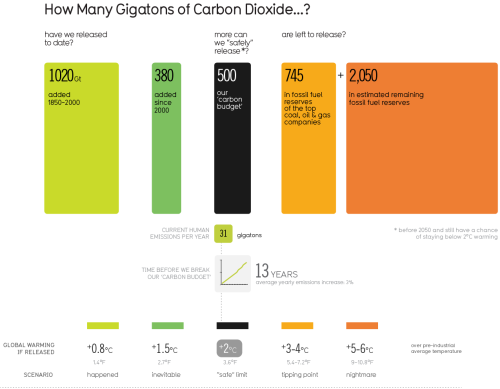I recently discovered the website Information is Beautiful, run by David McCandless. As a person with interest and some experience in creating maps, I truly respect the work that has gone into these thoughtful, elegant representations of reality. Please click on the link, because the image you see above is cropped. The original graphic gives much more terrifying detail about the possible outcomes of 3 – 6 degrees of warming, which seems likely, including the flooding of coastal cities, reduction in crop yields, ocean acidification and attendant fishery collapses, droughts, severe hurricanes.
This is an excellent graphic – I already knew most of the information in it, but one thing that leaped out at me, which I hadn’t really grokked before. That is the fact that fossil fuel extraction companies already possess in their reserves enough oil and gas to push us into ecological catastrophe. And of course they are still proposing new pipelines, new wells in the Arctic and the Gulf, the Tar Sands, and that’s before you even leave North America.
I hope you click that link and take a look – the image you see above is a cropped version of the original.
I have to confess that I am pessimistic about the future of our civilization. I’m pretty sanguine about the ultimate survival of humans qua humans, but that’s cold comfort when I consider the fact that my sister’s grandchildren may only know about the internet from stories told by bitter old survivors.
Let’s think for a minute about a few of the things we would have to do in order to really get serious about climate change. According to the experts who provided the data behind the image from Information is Beautiful, we have about 10 – 13 years to get really serious about doing something to stop or slow greenhouse gas emissions:
- Transportation: widespread replacement of fuel infrastructure for individual vehicles. Development of hydrogen or electric vehicles. Better yet, severe cutbacks in use of personal vehicles and large increase in public transportation and automobile alternatives such as bicycles
- Food: complete redesign of food production and distribution systems so that fewer calories of oil are burned in the process of growing the good and the process of moving it to the market that needs it, and agricultural land is managed sustainably so that it requires fewer fossil fuel-based inputs
- Housing: efficiency retrofits for all existing housing stock, stringent efficiency requirements for new construction, including possible the requirement of passive solar design and solar hot water heating
- Energy: complete redesign of electrical grid so it can deal with decentralized power production as well as peaks of various types of energy production throughout the day
- Consumer goods: entities that produce material goods for consumption should be responsible for entire life cycle of pollution generated by production, including greenhouse gases burned in transporting raw materials and finished goods from extraction to manufacture to market. “Recycle” would be a silly, redundant word, because it should be unthinkable to manufacture a product that can only be used once
These are all things which are completely doable – but they’re nearly impossible because our political system has been captured and subverted – and some of the same companies that are planning this irresponsible development of further fossil fuel extraction are the same that are causing the profound disconnect between what the constituents of our allegedly representative democracy want and need, and what their elected representatives are willing to do for them.
Take one example – in the housing category, one simple thing we could do is pass a law that all roof shingles and other roofing materials must be white or light-colored. This would increase the albedo, or average reflectivity of the land surface in the country, and that would slow the process of warming by sending more heat back out into space rather than keeping it here to get trapped by those greenhouse gases. And can you imagine the outcry from right wing Congressional representatives and the right wing media? How dare the government tell homeowners what color to paint their roofs! It’s unthinkable, at least for national legislation in the USA. Just that one tiny little thing.
So I’m pessimistic. Sad to say. I really hope I’m wrong, but I’m deadly scared that I’m right – and if I allow myself to contemplate the information, my heart starts to break and I can’t finish the work I was trying to do.
I do have suggestions for how we can achieve a change in our political system dramatic enough for us to make the drastic changes required to deal effectively with climate change, and I want to write about those too – but I doubt that 10 – 15 years is enough time to implement that change. I am still going to try, though.
EDIT: I have no idea why WordPress insists on transforming my hyperlinked text into text that is also HUGE.


